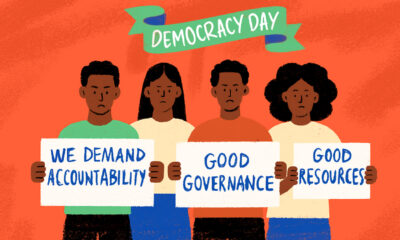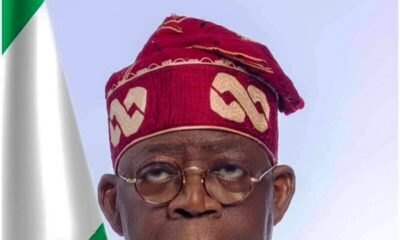News
E. Olatunji: Nigeria & Democracy Day
 Another working day, another reason not to go to work. I mean, I do not know how Nigerians do it! We are probably the country with the most public holidays in the world! How ridiculous is this? So I’m on the phone with my friend and she goes, ‘Oh, I have to go out tonight. No work tomorrow’, I’m like, ‘ah ahn! No work again? Please what is the occasion this time around?’ she goes, ‘it’s Democracy Day oh!’ Ah, Nigeria!
Another working day, another reason not to go to work. I mean, I do not know how Nigerians do it! We are probably the country with the most public holidays in the world! How ridiculous is this? So I’m on the phone with my friend and she goes, ‘Oh, I have to go out tonight. No work tomorrow’, I’m like, ‘ah ahn! No work again? Please what is the occasion this time around?’ she goes, ‘it’s Democracy Day oh!’ Ah, Nigeria!
Of all the ridiculous excuses to declare holidays, this has to be the height of it all. Perhaps, I should start by defining the concept of Democracy.
According to the Oxford English Dictionary as at 05:49 on 29th May 2014 a.k.a Democracy Day in Nigeria. Democracy means, ‘a system of government by the whole population or all the eligible members of a state, typically through elected representatives’. Let me break this definition into three parts.
a. ‘A system of government’: This part of the definition might call for another definition – system. System means, ‘A set of detailed methods, procedures and routines created to carry out a specific activity, perform a duty, or solve a problem.’ Following this more than accurate definition, what system of government can we say is in place in Nigeria? Where are the set of detailed methods, procedures and routines to carry out governmental assignments/ duties or to solve our multifaceted problems we, as a country, face in Nigeria? The constitution, perhaps? The non-existent, ceremonial document which Lord knows is probably filled with dust somewhere in one of the ‘national cakes?’ What system of government does the Nigerian government follow, please? Nigeria is a cry for help! It is so disheartening. You look at countries like Dubai who have used their oil producing capacity to transform its nation into a world wonder and you wonder. Why Nigeria? Why? I feel tears in my eyes as I write because it feels like we are going nowhere. Why really can this government of our nation have a wakeup call? Why can’t we implement a system of government? When will peace reign with our governance?
b. ‘…by the whole population or all eligible members of a state’: Section 2(1) of the Electoral Act 2002 says a person shall be qualified to register as a voter if he/she:
– Is a citizen of Nigeria.
– Has attained the age of 18 years.
– Is ordinarily resident, works in, originates from, or is an indigene of the Local Government Area or Ward covered by the registration centre.
– Presents himself/herself to the registration officers of the Commission for registration as a voter within the period stipulated for the exercise.
– Is not subject to any legal incapacity to vote under any laws, rules or regulations in force in Nigeria
With these factors required to vote, how many Nigerians who fall under these criteria have voted in recent times? Voting in Nigeria is taken with a pinch of salt. Majority among our modern-day youth are not moved to participate in this but who can blame them? Do these votes count? I was trying to plan for a visit from my 25 year old Greek friend to Nigeria the other day and I suggested a particular set of dates to her. She declined those dates because, ‘I have to be around in Greece for the elections, babe. Any date after that is fine’. That statement moved me. What 25 year old Nigerian will ever say that? Let us be realistic, please. However, I do not blame the youth. As a 22 year old Nigerian, voting has never crossed my mind. I can only imagine what a hectic process it will be, not to even think of the workers who will be assigned to handle this process that will treat you like you are doing them a favour by performing what a good citizen ought to (speaking from my experience with NYSC officials and general experience with Nigerian civil servants). The point here is, majority of the voting population do not participate in voting.
c. ‘…typically through elected representatives’: this is the most crucial part of any democratic system.
The people in government must have been elected. Whether or not majority of the people vote, the votes of those who do should be the determining factor of those who will occupy governmental positions. How transparent are our elections? Are the results really free and fair? How realistic is it that a particular political party dominates majority of our seats?
Nigeria, we need a wake-up call. We can continue to give silly excuses to have public holidays but the one we have given to the 29th of May is a façade. We are not a democratic country. It is ironic how many of the nations that have Democracy in place have not set out a day aside to celebrate this but we have. The United States has a democracy day but is only observed on the Tuesday after the first Monday in November of every even numbered year. Other countries that observe these are Nepal and Canada but these are all observed with a well laid out cause. The authenticity of the appointments of those in governmental places is questionable. If a public holiday must be observed, let us have a real reason to have one. Our nation is not where it is meant to be on any level. We have so much potential as a country. We cannot in 2014, the age of fast-growing technology still be struggling with issues such as electricity supply. Our roads are bad. Our schools are not well provided for. Our hospitals are not sufficiently supplied.
We need God in this country. We need a change. We need democracy
_______________________________________________________________________________________
E.Olatunji is a law graduate of Newcastle University, UK in her early twenties. Currently preparing to go to the Nigerian law school. She writes as a hobby and all views expressed are personal.



















